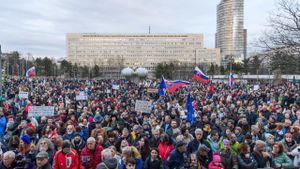U.S.-Russia Relations During the Trump Administration proved to be varied, often fluctuated between intrigue and tension, influenced primarily by the actions and statements of former President Donald Trump.
Upon his inauguration on January 20, 2017, Trump set the tone for his presidency with ambitions of fostering closer ties with Russia. He expressed interest in facilitating faster resolutions to conflicts, especially those relating to Ukraine—a matter heavily affected by Russian actions and the resulting international diplomatic fallout. Trump’s engagement was underscored by comments made by Russian President Vladimir Putin, who stated, "If I hadn’t lost the election, we wouldn’t have had this situation with Ukraine," reflecting his perspective on the connection between Trump's electoral defeat and geopolitical stability.
Despite neoliberal tensions, both leaders sought diplomatic channels to communicate their intentions. Early on, Trump publicly indicated his willingness to meet with Putin and explore possibilities to end the hostilities taking shape on the Ukrainian front. His administration's stance fluctuated, marked by the duality of seeking collaboration with Russia and implementing sanctions as leverage depending on Putin’s response to the Ukraine crisis.
On January 21, the day after his inauguration, Trump reiterated his openness to dialogue, mentioning, "We are ready to work together with the White House," as echoed by Putin. This expression of readiness for engagement aimed to ease the already tense atmosphere, marked by increased sanctions on Russia by the Obama administration.
The geopolitical climate grew complex as Russia intensified its involvement in Ukraine, leading to international condemnation and retaliatory measures. Subsequently, on January 24, Sergei Lavrov, the Russian Foreign Minister, stated Russia aimed to find peaceful solutions without freezing military actions, indicating the Kremlin's at times diverging stance from Trump's peace-oriented overtures.
According to analysts, Trump's conduct during his presidency created both possibilities for improved diplomatic relations as well as significant scenarios of confrontation. This dichotomy was fueled by Trump’s personal character as well as his administration’s strategic improvisations. Observers often debated how Trump's unorthodox policies—exemplified by his approach to China and NATO—affected the foundational aspects of U.S.-Russia relations.
Notably, Trump’s decision to engage directly with Putin was characterized by pragmatism. History has shown previous U.S. leaders' difficulties establishing rapport with the Kremlin, yet Trump's rhetoric suggested he was willing to pivot away from the conventional containment strategies embraced by prior administrations.
Nevertheless, the issue of sanctions on Russia loomed large during Trump's presidency, primarily as attempts to hold Putin accountable for actions deemed harmful to U.S. interests and allies. Trump's perceived friendliness toward Russia led to suspicion, especially amid Democrat-led conjectures about election interference and the investigation by Special Counsel Robert Mueller. This scrutiny complicated Trump's efforts to maintain clear communication lines with Russia.
The bipartisan critique culminated on various occasions throughout Trump’s presidency, especially when discussions of reducing troop deployments and sanctions arose. Senators and political figures remained skeptical of Trump's diplomatic overtures, leading to pronounced divisions based on expectations surrounding U.S.-Russia partnerships.
Despite the authoritative voice of Congress, Trump would often champion his unique ties and advocated for engagement, portraying negotiations with Russia as strategic advantage. It is amid this backdrop of these complex interactions and mixed messaging from the Trump administration moved to manage perceptions about legitimate interests.
By the latter part of his presidency, the relationship exhibited high levels of scrutiny, with critics arguing about the effectiveness of Trump’s policy maneuvers concerning Russia. These observations were heightened after the Ukraine crisis's final emergence, with many experts believing heightened aggressiveness led to tighter enforcements of sanctions post-2020 elections.
Trump’s administration illustrated the challenges inherent within U.S.-Russia relations—markedly filled with laden history and strategic play. The legacy of whether improved relations were achieved and possible future engagements continues to remain contentious, threading through debates on broader international relations and security issues.
With Trump's tenure officially completed, reflections pose inquiries on what direction U.S.-Russia relations might forge going forward, highlighting outcomes driven by past interactions, negotiations, and pivoted ambitions laid out through their respective dialogues.



